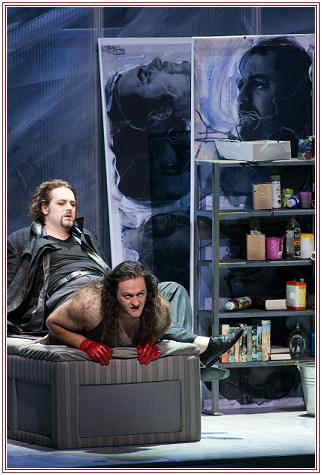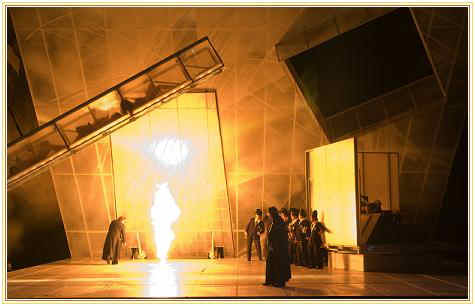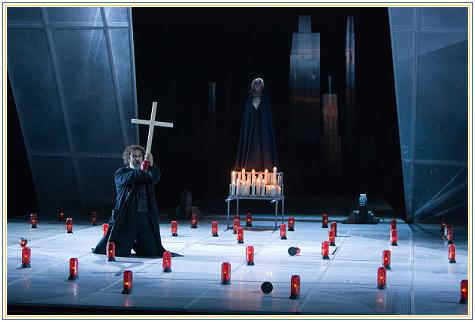Other Links
Editorial Board
- Editor - Bill Kenny
- London Editor-Melanie Eskenazi
- Founder - Len Mullenger
Google Site Search
SEEN
AND HEARD INTERNATIONAL OPERA REVIEW
Busoni, Doktor Faust:
Bavarian State Opera, Opera Festival 2008:
Soloists, Bavarian State
Opera Orchestra, Kent Nagano (conductor) Nationaltheater, Munich
28.6.2008 (JFL)
Production Team
Nicolas Brieger (direction)
Roy
Rallo (assistance)
Hermann Feuchter (sets)
Margit Koppendorfer (costumes)
Alexander Koppelmann (lighting)
Doktor Faust
Wolfgang Koch (Doktor Faust)
John Daszak (Mephistopheles / Night Watchman
Raymond Very (The Girl’s Brother, Duke of Parma, Megäros, Ghostly
Voice V)
Steven Humes (Wagner, Gravis, Ghostly Voice I)
Catherine Naglestad (Duchess of Parma)
Alfred Kuhn (Master of Ceremonies)
Further:
Adrian Sâmpetran, Ulrich Reß, Christian Rieger, Klaus Basten,
Rüdiger Trebes, Kenneth Robertson, Jason A. Smith, Marcel Görg,
Werner Bind, Ingolf Kumbrink, Jochen Schäfer, Elif Aytekin, Laura
Rey, Stephanie Hampl
In turns grim and fantastical, Wolfgang Koch (Doktor Faust), John
Daszak (Mephistopheles), Raymond Very (Duke, Valentin – “the Girl’s
brother”, et al.), Catherine Naglestad (Duchess of Parma), and
Steven Humes (Wagner) sang and acted their way through this beastly,
beautiful work that engulfs the senses with renaissance sounds and
chorales, a romantic chromatic haze, expected Wagnerian touches and
unexpected moments of Offenbach. Steven Humes had little voice-time
to showcase his skills, but his strong, blooming baritone pushed
Wagner – who later takes over Faust’s job as Rector magnificus
– to the forefront. Koch’s baritone carried well and never tired.
His and Daszak’s performance are primarily the ones where effort
turned into achievement and achievement into something
extraordinary. Daszak who gave Mephistopheles his tenor, was
piercing in his comfortable range, offered a positive sense of
struggle here and there, and was covered by the orchestra only early
on. The female relief of the opera, Catherine Naglestad, charmed
the audience with strong singing and acting, even with a strong
metallic vibration in her voice. No one else exceeded, or fell short
of, reasonable expectations and requirements.

Composers, too, have been inspired – usually via Goethe: Wagner
wrote a Faust Overture (not his most inspired moment), and
Liszt the
Faust Symphony.
Mahler’s
Eight Symphony
bases its second part on Faust II. Schubert composed the Lied
“Gretchen
am Spinnrade”, and Schumann his overly ambitious,
terrifically strange (and strangely terrific) Scenes from
Goethe's Faust. (The good recordings –
Herreweghe,
Abbado,
Klee
– are out of print, but a new one with
Christian
Gerhaher might be recorded soon.) Lili Boulanger
contributed a half hour cantata
Faust et Hélène,
Dusapin
Faustus, The
Last Night (owing more to Marlowe than
Goethe). Prokofiev’s
Fiery Angel,
Stravinsky’s
The Rake’s
Progress, and even Adams’ Doctor Atomic
are adaptations – albeit loose ones – of Faust.
“Only Mozart” (who had already died), did Goethe proclaim as
capable of writing an opera of his Faust – but that did not
keep others from trying. Arrigo Boito succeeded most resoundingly
with
Mefistofele,
Berlioz’ “légende dramatique”
La Damnation de
Faust offers the most boldly literal operatic
take, and Gounod’s
Faust
(formerly known as Maguerite) makes it an example of how
grand French opera should be.

“German” (in the loosest sense) composers must have found the
Goethe-model a little too daunting. First Louis Spohr (“Faust”),
most recently Alfred Schnittke (“Die
Historia von D. Johann Fausten”), and in between
Ferruccio Busoni with
Doktor Faust
all tackled the subject from different directions. Busoni used the
16th century puppet plays – the same source that inspired
Goethe – to avoid direct comparison. But he also drew on Heinrich
Heine’s
Der Doktor Faust
– Ein Tanzpoem and very likely on
F.T.Vischer’s Faust III.
From these sources Busoni created one of the great German 20th
century operas, an opera that is finally catching on with recent
performances in New York, San Francisco, Stuttgart, Zurich, Berlin (Unter
den Linden), and now Munich, where it opened the
2008 Opera
Festival. Director Nicolaus Brieger (with Hermann
Feuchter’s sets, Margit Koppendorfer’s costumes, and Alexander
Koppelmann’s lighting) achieved the small miracle of staging
Busoni’s magnum opus for the festival premiere without incurring any
of the near-customary “boos” that accompany them. If the lack of
vocal disagreement was accompanied by slightly less than
enthusiastic cheering, it might have been because many ears had
difficulty digesting the nearly three hours of Busoni’s music – even
80 years after its premiere.
In Zurich, Philippe Jordan turned the orchestral score into the
highlight next to the superb, fittingly haughty Faust of Thomas
Hampson’s. In Munich Tomáš Netopil, winner of the first Sir Georg
Solti Conducting Competition, navigated rather dutifully through the
score, neglecting nothing and offering – occasionally – gripping
moments. The main attractions were Brieger’s direction though, the
successful effort and achievement of the singers, and most of all
Busoni’s opera itself.

Perhaps because there was much staging to pay attention to: Faust
and his puppet-likenesses (wonderfully animated by Peter Lutz, Lutz
Grossmann, and Rike Schubert); the set that looks like Rem Koolhaas
meets Starship Enterprise; the vaguely Wehrmacht-like soldiers who
drill organ pipes through Valentine’s body when Mephisto has him
killed on the altar; and especially the naked, bronzed demons that
dangle above Faust as he summons Lucifer’s servants Gravis, Levis,
Asmodus, Belzebub, and Megaros. That last being the most iconic
scene of the production – a visual coups de théâtre.
Mephistopheles himself is the red-gloved, wig-wearing seducer who
dons a bikini-top on his bulky, hairy frame. The grotesque androgyny
doesn’t last long, thankfully, but long enough to start wondering
just how real Mephistopheles is to Faust, and how much he is a
figment - a creation- of his will and imagination. From there, Faust
moves toward ‘will and realization’ of having left convention,
society, and morality so far behind that no redemption is possible
for him. His prayers impotent, he heaves himself beyond categories
of good and evil, God and Devil. He manifests himself (or wishes to
do so) in ‘will’ itself. The bubble of grandeur, if there is one, is
pricked immediately when Mephistopheles, in the guise of the Night
Watchman, finds Faust’s corps and drags him away, sardonically
stating: “Should this man have been met with misfortune?”
A visual feast and auditory joy, the Munich Doktor Faust –
played in the original, unfinished version, not the Jarnach or
Beaumont completion – is not a production for the ages, but it will
do much in bringing this fascinating composer back to the opera
stages where he deserves to be much more often. And eventually not
just with Doktor Faust but also –eventually– his Turandot,
Die Brautwahl, and Arlecchino.
All
Pictures © Wilfried H
Back to Top Cumulative Index Page
